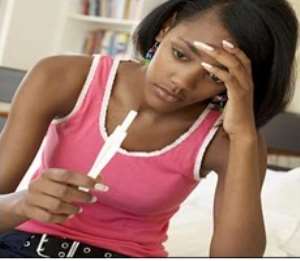
Just because you're a 34-year-old woman, doesn't mean you need to start procreating with the first guy you see on the street.
That's the takeaway from a new study that has shattered the common wisdom about infertility. Thirty-five, the supposed age at which infertility begins to set in, has long been a feared number among women. And though long a concern, the new millennium brought added focus — and anxieties — regarding baby-making post-35.
In 2001, the American Society for Reproductive Medicine (ASRM) warned that fertility began to decrease after age 27. In 2002, Sylvia Ann Hewlett's Creating a Life: Professional Women and the Quest for Children prominently featured a survey showing that more than half of professional women over 35 are childless.
As a result, the prevailing belief of the 21st century has been that a woman's likelihood of conceiving falls faster that Wilie E. Coyote off a cliff once she's on the ugly side of 30.
Turns out, that's not actually the case.
Dr. Jean Twenge at The Atlantic not only dispels that myth, but also explains the frighteningly bad science behind it.
For one, a popular statistic that one in three women ages 35 to 39 cannot get pregnant after a year of trying is based on French birth records from 1670 to 1830. "In other words, millions of women are being told when to get pregnant based on statistics from a time before electricity, antibiotics or fertility treatments," writes Twenge. "We've rearranged our lives, worried endlessly, and forgone countless career opportunities based on a few statistics about women who resided in thatched-roof huts and never saw a light bulb."
Studies conducted with actual women during the 21st century show a very different fertility picture. Twenge cites a 2004 study published in Obstetrics & Gynecology that showed 82 percent of women ages 35 to 39 conceived within a year of having sex at least twice a week, not much lower than the 86 percent of women ages 27 to 34 under the same conditions.
Another study Twenge cites was released this year in Fertility and Sterility. It showed that 78 percent of women ages 35 to 40 got pregnant within a year of having sex during their fertile times, compared with 84 percent of women ages 20 to 34. So, there's a drop, but hardly one that should send women into a "baby panic," as Twenge calls it.
However, Twenge's article doesn't mean age doesn't affect fertility; there are some qualifications. While fertility may not dive after 35, there is a significant drop after age 40, Dr. Jamie Grifo of the New York University Fertility Center tells ABC News. After age 40, every two years a women's fertility decreases by half, he says. To the 40+ crowd, Grifo says, "I don't want to make it sound like, 'Hey! You should count on being able to get pregnant' because you shouldn't count on being able to get pregnant."
Still, Twenge's article sheds some positive light on an infertility misconception that has driven fear into the hearts of thirty and twenty-something women for years. "The drop isn't nearly as precipitous as it's often made out to be in the media," writes Callie Beusman at Jezebel. "So stop stressing. Go forth and conquer. Father Time has better things to do than fuck with your ovaries."




 Court dismisses Serwaa Amihere case against Henry Fitz, two others
Court dismisses Serwaa Amihere case against Henry Fitz, two others
 Stolen BRVs: Bi-partisan parliamentary probe non-negotiable — Dr. Omane Boamah
Stolen BRVs: Bi-partisan parliamentary probe non-negotiable — Dr. Omane Boamah
 Bawumia begins regional campaign tour on Monday
Bawumia begins regional campaign tour on Monday
 With great urgency backed by verifiable data, facts and figures dismiss COCOBOD,...
With great urgency backed by verifiable data, facts and figures dismiss COCOBOD,...
 EC’s statement on obsolete BVDs discovery “lies, half-truths, pure fantasies” – ...
EC’s statement on obsolete BVDs discovery “lies, half-truths, pure fantasies” – ...
 Nalerigu court impound vehicles of DCE, Director of Chereponi district for owing...
Nalerigu court impound vehicles of DCE, Director of Chereponi district for owing...
 Cop, 7 others grabbed over $523,000 Gold Scam
Cop, 7 others grabbed over $523,000 Gold Scam
 Akufo-Addo’s driver wins Dadekotopon NPP Parliamentary Primary
Akufo-Addo’s driver wins Dadekotopon NPP Parliamentary Primary
 Investigate, jail persons liable for GRA-SML contract – Manasseh
Investigate, jail persons liable for GRA-SML contract – Manasseh
 Lawyer wins Akan NPP Parliamentary Candidate primary
Lawyer wins Akan NPP Parliamentary Candidate primary
